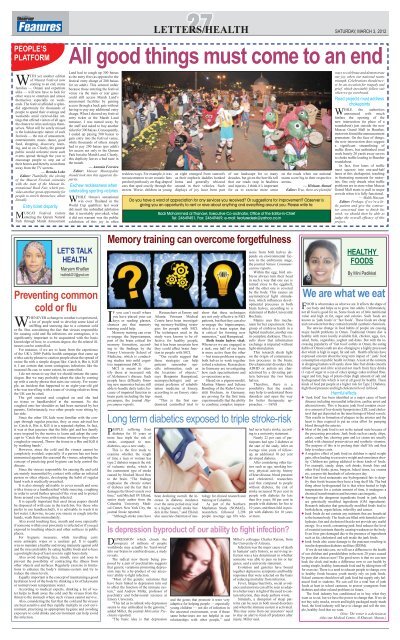Observer & Busness 3 Mar 2012 - Oman Daily Observer
Observer & Busness 3 Mar 2012 - Oman Daily Observer
Observer & Busness 3 Mar 2012 - Oman Daily Observer
You also want an ePaper? Increase the reach of your titles
YUMPU automatically turns print PDFs into web optimized ePapers that Google loves.
PEOPLE’S<br />
PLATFORM<br />
WITH yet another edition<br />
of Muscat Festival now<br />
coming to an end, many<br />
families — <strong>Oman</strong>i and expatriate<br />
alike — will now have to look for<br />
other ways to entertain and amuse<br />
themselves especially on weekends.<br />
The festival afforded a splendid<br />
opportunity for thousands of<br />
people to spend their evenings and<br />
weekends amid carnival-like settings<br />
that offered visitors of all ages<br />
the chance to relax and enjoy themselves.<br />
What will be sorely missed<br />
is the kaleidoscopic nature of such<br />
festivals — the mix of amusement,<br />
entertainment, music, dance, good<br />
food, shopping, discovery, learning,<br />
and so on. Clearly, the general<br />
public would welcome more such<br />
events spread through the year to<br />
encourage people to step out of<br />
their homes and thereby wean them<br />
away from the TV screens.<br />
— Brenda Lobo<br />
Editor: Thankfully, the closing<br />
of the Muscat Festival coincides<br />
with the start of the Muscat International<br />
Book Fair, which provides<br />
another great opportunity for<br />
people to enrich themselves, albeit<br />
literally.<br />
Entry ticket disparity<br />
MUSCAT Festival visitors<br />
entering the Qurum Natural<br />
Park through <strong>Mar</strong>ah Amusement<br />
Land had to cough up 300 baisas<br />
as the entry free (as opposed to the<br />
festival entry charge of 200 baisas<br />
for an adult). This seemed unfair<br />
because those entering the festival<br />
venue via the main or rear gates<br />
could still access <strong>Mar</strong>ah Land’s<br />
amusement facilities by gaining<br />
access through a back gate without<br />
having to pay any additional entry<br />
charge. When I showed my festival<br />
entry ticket at the <strong>Mar</strong>ah Land<br />
entrance, I was turned away by<br />
the staff and asked to buy another<br />
ticket for 300 baisas. Consequently,<br />
I ended up paying 500 baisas to<br />
gain entry into the festival venue,<br />
while thousands of others simply<br />
had to pay 200 baisas (per adult)<br />
for access not only to the Qurum<br />
Park but also <strong>Mar</strong>ah Land. Clearly,<br />
this duplicity leaves a bad taste in<br />
the mouth.<br />
— Antonia Ferreira<br />
Editor: Muscat Municipality<br />
should look into this apparent disparity.<br />
Eschew recklessness when<br />
celebrating sporting victories<br />
WHILE <strong>Oman</strong>’s sensational<br />
win over Thailand in the<br />
World Cup qualifiers last week<br />
did merit the unbridled jubilation<br />
that it inevitably provoked, what<br />
it did not warrant was the public<br />
exhibition of this joy in often<br />
reckless ways. For example, it was<br />
not uncommon to see ecstatic fans<br />
perched perilously on flag-draped<br />
cars that sped crazily through the<br />
streets. Worse, children as young<br />
27<br />
LETTERS/HEALTH SATURDAY, MARCH 3, <strong>2012</strong><br />
All good things must come to an end<br />
LET’S TALK<br />
HEALTH<br />
<strong>Mar</strong>yam Khalfan<br />
healthtalk<strong>2012</strong>@gmail.com<br />
Preventing common<br />
cold or flu<br />
WHENEVER a change in weather is experienced,<br />
a lot of people tend to develop some kind of<br />
sniffling and sneezing due to a common cold<br />
or flu. But, considering the fact that viruses responsible<br />
for causing cold and flu infections are contagious, it is<br />
significantly important to be acquainted with the basic<br />
knowledge of how, to a certain degree, the flu related illnesses<br />
can be controlled.<br />
For instance, if we are to learn from the experience<br />
of the UK’s 2009 Public health campaign that came up<br />
with a catchy phrase to caution people about the spread of<br />
swine flu with a simple slogan like: Catch it, Bin it, Kill<br />
it. I am certain that some contagious infections like the<br />
seasonal flu can, to some extent, be controlled.<br />
I do not mean to say that we should imitate the same<br />
slogan. But we may probably adopt the idea by coming<br />
up with a catchy phrase that suits our society. For example,<br />
an incident that happened to an eight-year-old girl<br />
who was travelling with a team of visiting relatives from<br />
the UK can be cited.<br />
The girl sneezed and coughed on and she had<br />
no tissue or handkerchief at the moment. So she<br />
coughed onto her shoulder as had been nurtured by her<br />
parents. Unfortunately, two other people were sitting by<br />
her side.<br />
Since the other UK kids were familiar with the concept<br />
through regular practice, they at once advised her<br />
to: Catch it, Bin it, Kill it in a repeated rhythm. In fact,<br />
it was at that juncture that the little girl and her family<br />
were inspired by the motive to learn and adopt the concept<br />
to ‘Catch the virus with tissue whenever they either<br />
coughed or sneezed, Throw the tissue in a Bin and Kill it<br />
by washing hands’.<br />
However, since the cold and flu viruses cannot be<br />
completely avoided; especially if a person has not been<br />
immunised against the seasonal flu viruses, adopting the<br />
concept of practicing good hygiene can help control the<br />
disease.<br />
Since the viruses responsible for causing flu and cold<br />
are mainly transmitted by contact with either an infected<br />
person or other objects, developing the habit of regular<br />
hand wash is medically preached.<br />
It is also strongly advisable to cover mouth and nose<br />
with a tissue or a handkerchief while sneezing, coughing<br />
in order to avoid further spread of the virus and to protect<br />
those around you from getting infected.<br />
It is equally important that used tissue papers should<br />
be disposed of with care in the trash bin. For those who<br />
prefer to use handkerchiefs, it is advisable to wash it in<br />
hot water. Likewise, in case you sneeze or cough into the<br />
hands, wash them immediately.<br />
Also avoid touching face, mouth and nose especially<br />
if someone within your proximity is infected or if you get<br />
exposed to touching objects and other surfaces in public<br />
places.<br />
For hygienic measures, while travelling carry<br />
some antiseptic wipes or a sanitiser gel. It is equally<br />
wise to maintain a healthy and strong immunity against cold<br />
and flu virus preferably by eating healthy foods and to have<br />
a good night sleep of least seven to eight hours daily.<br />
Also avoid touching face, mouth, eyes and nose to<br />
prevent the possibility of contracting the illness from<br />
other objects and surfaces. Regularly exercise in limitations<br />
to enhance the body’s immune-system and try to<br />
reduce the stress levels.<br />
Equally important is the concept of maintaining a good<br />
hydration level of the body by drinking a lot of lukewarm<br />
or normal room temperature water.<br />
According to medical experts, drinking a lot of water<br />
helps to flush away the cold and flu viruses from the<br />
throat to the stomach where such viruses cannot survive.<br />
Also, considering the fact that the cold and flu viruses<br />
are heat sensitive and they rapidly multiply in cool environment,<br />
practicing an appropriate hygiene and avoiding<br />
exposure to cold drinks and environment can help avoid<br />
the infection.<br />
as eight emerged from sunroofs<br />
as their euphoric daddies honked<br />
horns and generally whizzed<br />
around in their vehicles. Such<br />
displays of joy have been part<br />
of our landscape for so many<br />
decades, but given the horrific toll<br />
that our roads reap in fatalities<br />
and injuries, I think it’s important<br />
for us to exercise more sense<br />
on the roads when our national<br />
teams score big in their respective<br />
arenas.<br />
— Hisham Ahmed<br />
Editor: True, there are plentiful<br />
Do you have a word of appreciation for any services you received? Or suggestions for improvement? <strong>Observer</strong> is<br />
giving you an opportunity to rant or rave about anything and everything around you: Please write to:<br />
Badr Mohammed al Thanawi, Executive Co-ordinator, Office of the Editor-in-Chief<br />
Tel: 24649451, Fax: 24649469; e-mail: featuredesk@yahoo.co.in<br />
Memory training can overcome forgetfulness<br />
IF you can’t recall where<br />
you have placed your car<br />
keys or reading glasses,<br />
chances are that memory<br />
training could help.<br />
Memory training can even<br />
re-engage the hippocampus,<br />
part of the brain critical for<br />
memory formation, according<br />
to the findings by the<br />
Emory University School of<br />
Medicine, which is conducting<br />
studies into mild cognitive<br />
impairment (MCI).<br />
MCI is meant to identify<br />
those at increased risk<br />
of Alzheimer’s disease. Such<br />
people have difficulty forming<br />
new memories but are still<br />
able to handle daily tasks, because<br />
of impaired function in<br />
brain parts including the hippocampus,<br />
the journal Hippocampus<br />
reports.<br />
Researchers at Emory and<br />
Atlanta Veterans Medical<br />
Centre have been investigating<br />
memory-building strategies<br />
for people with MCI.<br />
The techniques used in the<br />
study were known to be effective<br />
for healthy people,<br />
but it has been uncertain how<br />
they could affect brain function<br />
in people with MCI.<br />
“Our results suggest that<br />
these strategies can help<br />
patients remember specific<br />
information, such as<br />
the locations of objects,”<br />
says Benjamin Hampstead,<br />
neuropsychologist and assistant<br />
professor of rehabilitation<br />
medicine at Emory,<br />
according to an Emory statement.<br />
“This is the first randomised<br />
controlled trial to<br />
show that these techniques<br />
are not only effective in MCI<br />
patients, but that they can also<br />
re-engage the hippocampus,<br />
which is a brain region that<br />
is critical for forming new<br />
memories,” said Hampstead.<br />
Both brain halves vital:<br />
Whenever we are engaged in<br />
a task, one half of our brain<br />
is more active than the other<br />
— but some problems require<br />
both halves to work together<br />
to find a solution. Researchers<br />
in Germany are investigating<br />
how such specialisations and<br />
co-operations arise.<br />
Based on a pigeon-model,<br />
<strong>Mar</strong>tina Manns and Juliane<br />
Romling of the Ruhr-Universität<br />
Bochum, in Germany,<br />
are proving for the first time<br />
experimentally that the ability<br />
to combine complex impres-<br />
sions from both halves depends<br />
on environmental factors<br />
in the embryonic stage,<br />
the journal Nature Communications<br />
reports.<br />
Within the egg, bird embryos<br />
always turn their head<br />
in such a way that one eye is<br />
turned close to the eggshell,<br />
and the other one is covered<br />
by the body. This causes an<br />
asymmetrical light stimulation,<br />
which influences developmental<br />
processes in both<br />
brain halves, according to a<br />
statement of Ruhr-Universität<br />
Bochum.<br />
Manns uses this mechanism<br />
for her experiment. One<br />
group of embryos hatch in a<br />
lighted incubator, another one<br />
in complete darkness. The results<br />
show that information<br />
exchange is impaired without<br />
light-stimulation.<br />
This research sheds light<br />
on the origin of communication<br />
processes in the brain.<br />
Developmental disorders like<br />
ADHD or autism are characterised<br />
by a deviating pattern<br />
between the two brain<br />
halves.<br />
Therefore, there is a<br />
possibility that the results<br />
may help to understand those<br />
disorders and open the way<br />
for better therapeutic approaches.<br />
— IANS<br />
Long term diabetics exposed to triple stroke-risk<br />
PEOPLE suffering from<br />
diabetes for 10 years or<br />
more face triple the risk of<br />
stroke, compared to nondiabetics,<br />
says a new study.<br />
This is the first study to<br />
examine whether the length<br />
of time a man or woman has<br />
type 2 diabetes impacts the risk<br />
of ischemic stroke, which is<br />
the commonest type of stroke<br />
caused by blocked blood flow<br />
to the brain. “The findings<br />
emphasise the chronic nature<br />
of diabetes and the fact that it<br />
damages the blood vessels over<br />
time,” said Mitchell SV Elkind,<br />
senior study author from the<br />
Columbia University Medical<br />
Center, New York City, the<br />
journal Stroke reported.<br />
“Although stroke rates have<br />
DEPRESSION which clouds the<br />
prospects of millions of people<br />
worldwide may actually be ‘hard-wired’<br />
into our brains to combat disease, a study<br />
reveals.<br />
The radical new theory being proposed<br />
by a pair of psychiatrists suggests<br />
that genetic variations promoting depression<br />
may be a by-product of our ancestors’<br />
ability to fight infection.<br />
“Most of the genetic variations that<br />
have been linked to depression turn out<br />
to affect the function of the immune system,”<br />
said Andrew Miller, professor of<br />
psychiatry and behavioural sciences at<br />
Emory University.<br />
“This led us to rethink why depression<br />
seems to stay embedded in the genome,”<br />
added Miller, the journal Molecular Psychiatry<br />
reported.<br />
“The basic idea is that depression<br />
been declining overall, the increase<br />
in diabetes incidence<br />
over the same period may lead<br />
to a higher overall stroke burden<br />
in the future,” said Elkind,<br />
also associate chairman of neu-<br />
rology for clinical research and<br />
training at Columbia.<br />
As part of the Northern<br />
Manhattan Study (NOMAS),<br />
researchers followed 3,298<br />
people (average age 69) who<br />
and the genes that promote it were very<br />
adaptive for helping people — especially<br />
young children — not die of infection in<br />
the ancestral environment, even if those<br />
same behaviours are not helpful in our<br />
relationships with other people,” said<br />
had never had a stroke, according<br />
to a university statement.<br />
Nearly 22 per cent of participants<br />
had type 2 diabetes at<br />
the start of the study. After an<br />
average nine years of followup,<br />
an additional 10 per cent<br />
developed diabetes.<br />
After considering other factors<br />
such as age, smoking history,<br />
physical activity, history<br />
of heart disease, blood pressure<br />
and cholesterol, researchers<br />
said that compared to people<br />
without diabetes, the risk of<br />
stroke increased 70 per cent in<br />
people with diabetes for less<br />
than five years; 80 per cent in<br />
people with diabetes for five to<br />
10 years; and three-fold in people<br />
with diabetes for 10 years<br />
or more.<br />
Is depression byproduct of our ability to fight infection?<br />
Miller’s colleague Charles Raison, from<br />
the University of Arizona.<br />
Infection was the major cause of death<br />
in humans’ early history, so surviving infection<br />
was a key determinant in whether<br />
someone was able to pass on his or her<br />
genes, said a university statement.<br />
Evolution and genetics have bound<br />
together depressive symptoms and bodily<br />
responses that were selected on the basis<br />
of reducing mortality from infection.<br />
Fever, fatigue/inactivity, social avoidance<br />
and anorexia can all be seen as adaptive<br />
behaviours in light of the need to contain<br />
infection, they study authors wrote.<br />
Similarly, a disruption of sleep patterns<br />
can be seen in both mood disorders<br />
and when the immune system is activated.<br />
This may come from our ancestors’ need<br />
to stay on alert to fend off predators after<br />
injury, Miller said.<br />
ways to celebrate and demonstrate<br />
our joy when our national teams<br />
triumph. Celebrations should never<br />
be an occasion for tragedy and<br />
grief, which inevitably follow suit<br />
when we go overboard.<br />
Road projects must address<br />
chokepoints<br />
WHILE the authorities<br />
announced with much<br />
fanfare the opening of the<br />
new intersection (in place of a<br />
roundabout) just outside the new<br />
Muscat Grand Mall in Bausher,<br />
motorists found the announcement<br />
premature. On the face of things,<br />
the new intersection does suggest<br />
a significant streamlining of<br />
traffic flows, but unfinished road<br />
work barely 20 yards away serves<br />
to choke traffic leading to Bausher<br />
roundabout.<br />
In fact, four lanes of traffic<br />
must squeeze into one-and-half<br />
lanes at this chokepoint, resulting<br />
in frustrating moments for motorists.<br />
One only dreads what traffic<br />
problems are in store when Muscat<br />
Grand Mall starts to pull in major<br />
crowds when it is fully functional.<br />
— Malik Hassan.<br />
Editor: Perhaps, if we’re a little<br />
patient and give the contractor<br />
concerned time to finish his<br />
work, we should then be able to<br />
judge the overall efficacy of this<br />
project.<br />
HEALTHY<br />
FOODS<br />
By Mini Padikkal<br />
We are what we eat<br />
FOOD is what makes us what we are. It affects the shape of<br />
our body and helps us to grow into adults. Unfortunately,<br />
not all food is good for us. Some foods are of little nutritional<br />
value and high in fat, sugar and calories. Such foods are<br />
known as ‘junk foods’ or ‘fast foods’. These foods are cheap<br />
and convenient but they contain harmful synthetic chemicals.<br />
The unwise change in food habits of people are causing<br />
major health problems in <strong>Oman</strong>. Traditional <strong>Oman</strong>i diet is<br />
healthy with more locally available fish, chicken, eggs, rice,<br />
salad, fruits, vegetables, yoghurt and dates. But with the increasing<br />
popularity of ‘fast food’ outlets in <strong>Oman</strong>, the eating<br />
habits of <strong>Oman</strong>i youth are also changing to a highly processed<br />
diet which is high in sugar, fat and salt. Health officials have<br />
expressed concern about the long term impact of ‘ junk’ food<br />
consumption on public health in <strong>Oman</strong>. A look at the contents<br />
in shopping baskets will surely show fake fruit drinks (mostly<br />
refined sugar and citric acid and not much fruit) fizzy drinks<br />
(1 cup of sugar in a can of coke) spongy cakes (refined flour,<br />
sugar and fat), bags of potato chips (high amount of salt and<br />
hydrogenated fats which is not at all good for health). These<br />
kinds of food put people at a higher risk for Type 2 Diabetes,<br />
high blood pressure and high cholesterol level in blood.<br />
Harmful effects<br />
‘Junk food’ has been identified as a major cause of heart<br />
diseases including myocardial infarction, cardiac arrest and<br />
atherosclerosis. This is because junk food contains excessive<br />
amount of low-density lipoproteins (LDL) and cholesterol<br />
that get deposited on the inner linings of blood vessels.<br />
This results in formation of plaques in the arteries and the<br />
heart is then required to put an extra effort for pumping<br />
blood through the arteries.<br />
Most of the junk food is not in the natural state because of<br />
the processing procedure. Junk foods such as candy, chips,<br />
cakes, candy bar, chewing gum and ice cream are usually<br />
added with chemical preservatives and synthetic vitamins.<br />
The purpose of this is to prolong their shelf life and thus<br />
help to reduce costs.<br />
A negative effect of junk food on children is rapid weight<br />
gain, often leading to excessive weight and sometimes obesity.<br />
Children are getting addicted to these kinds of foods.<br />
For example, candy, chips, soft drinks, french fries and<br />
other fried foods, pizza, burgers, baked items, ice creams<br />
etc, can provide hundreds of calories per day.<br />
Most fast food restaurants use hydrogenated fats to deepfry<br />
their foods because they have a long shelf life. The bad<br />
thing about hydrogenated fat is that when heated to high<br />
temperatures for a certain amount of time, it undergoes a<br />
chemical transformation and becomes carcinogenic.<br />
Amongst the dangerous ingredients found in junk foods<br />
are genetically modified ingredients (GM ingredients).<br />
Research indicates that genetically modified foods lead to<br />
birth defects, organ failure, infertility and cancer.<br />
Junk foods do not contain any nutrients that are beneficial<br />
to the human body. The foods are filled with harmful carbohydrates,<br />
fats and cholesterol that do not provide any useful<br />
energy. As a result, consuming junk food reduces the level<br />
of essential nutrients thereby causing weakness in the body.<br />
Even liver gets damaged due to the presence of ingredients<br />
such as fat, cholesterol and salt inside the junk foods.<br />
Junk foods also cause damage to the pancreas resulting in<br />
insulin-dependent diabetes mellitus (IDDM).<br />
If we do not take care, we will see a difference to the health<br />
of our children and grandchildren in the next 20 years caused<br />
by poor diet choices now! The good news is that we can turn<br />
back the clock and make a difference now to our health by<br />
eating simple, healthy, homemade food and by taking time off<br />
for exercise. There is a need to educate people to change over<br />
to healthy foods because youth mostly rely on junk foods.<br />
School canteens should not sell junk food but supply only balanced<br />
food to students. We can call for a total ban of junk<br />
foods at least in school canteens, to protect youngsters from<br />
diabetes and other related problems in future.<br />
The food industry has conditioned us to buy what they<br />
want us to eat, but we have the power to change that. If we do<br />
not buy salty snacks, sweets and highly packaged ready-made<br />
food, the food industry will have to change and sell the simple,<br />
healthy food that we want.<br />
(Note: The writer is a dietician at<br />
Atlas star Medical Centre, Al Khuwair, Muscat.)
















